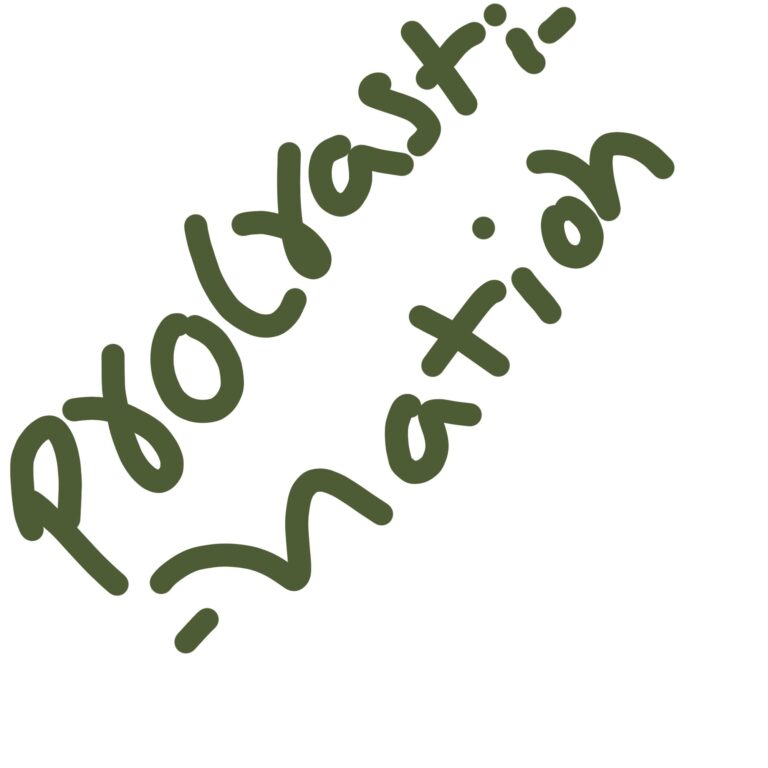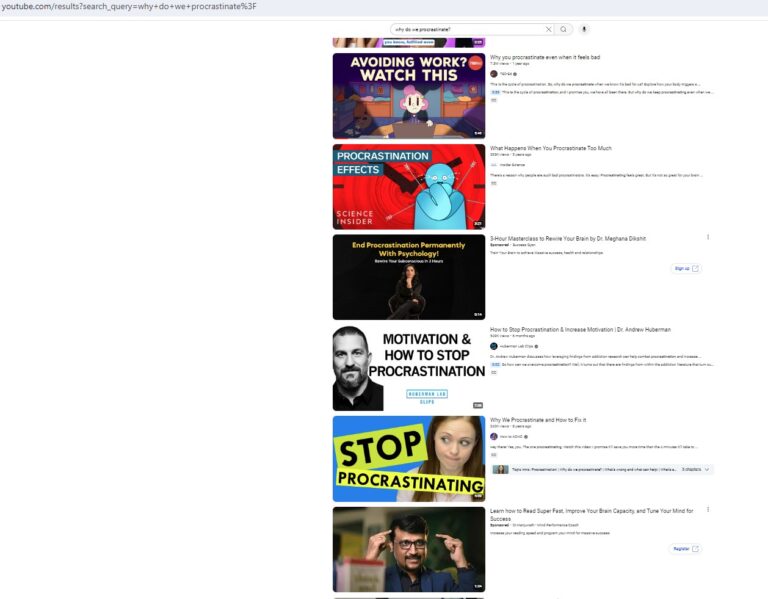
Okay okay okay!!!, in this segment, you and I will learn about some things together using the internet. Many of us waste a lot of time online, and I am one of them. So, I thought we should learn or discover something together. I chose the subject of procrastination. We’ll explore it together, so let’s get started.
I started my research on Sunday, May 26th, 2024, and spent about 2 hours every day on average. I watched some videos and read many articles. Finally, after a week, I managed to prepare this post. I had 5-6 questions in my mind, and I searched for answers on YouTube, Google, Quora, and various blogs. There were a lot of points, and I couldn’t include everything, so I made a post with what I understood and found interesting. I’ll also share some screenshots of my Google searches. I hope this effort will benefit you too.
Q1) What is procrastination?
The act of putting off doing something that you should do till another day or time, because you do not want to do it. (This definition has been taken from the dictionary.)
Procrastination is when you delay doing something you need to do because you don’t feel like doing it right now. Instead, you put it off for later, often finding excuses or distractions to avoid starting the task. (I found this in some article when I looked a bit further)
And I found a very simple term, which is ‘Procrastination is when you delay.’
It’s very simple, but also complicated, but these three definitions have given us a good idea.
Q2) Why we do procrastination?
I searched on Google and YouTube and want to share some images from the results with you.


After spending some days on videos and articles, I found some very good points and some unique ones, and I picked them up, and some of those points are like this…
Urgency: We often procrastinate until a task becomes urgent, and then we focus and work hard to complete it at the last minute. Because Our brain works under urgency.
Fear: We delay because we’re scared of not doing well or failing.
Lack of motivation: No interest means no motivation, which leads to procrastination.
Dopamine: (A chemical in the brain that makes us feel pleasure, happiness, and motivation when we achieve something or receive a reward.) Nowadays, our brains have become accustomed to quick dopamine hits, and that’s also a reason why we delay many tasks.
Immediate result vs delayed result: If it takes me a week to read a book and I’ll feel satisfied only after completing it, why should not I prioritize scrolling through reels to entertain myself instantly.
Habit: Some of our habits can cause us to procrastinate.
‘I’ve covered most of the points, but some special ones still need to be mentioned. Poor time management, Attention spam, Harder and easier and list goes on. So, I need to stop here .
Before we discuss how to overcome procrastination, let’s consider if it can have any benefits.
One of the first benefits of procrastination that I’ve noticed is that it helps you identify what truly motivates and interests you. When you understand this, you can channel your procrastination into positive activities. For example, you often delay office tasks and projects, but in that time, you find yourself more engaged in drawing or writing poems. This insight is valuable.
Secondly, delaying tasks isn’t always bad. As humans, we think and often drift into daydreams. I frequently postpone various tasks and, while I agree that not everything should be delayed (we’ll discuss this next), I often revisit these delayed tasks with a new perspective. Sometimes, I have less time to complete them because I’ve been daydreaming or doing something creative, but this pressure leads me to discover creative and efficient ways to finish them quickly. These shortcuts and innovative approaches might not have come to me if I hadn’t procrastinated.
In many cases, Sometimes procrastination can actually be beneficial.
Q2) How to avoid/overcome/stop/(and whatever you want to say) procrastination?
Let’s break down the ways to avoid procrastination….
Set clear goals and priorities : We should know what we want and what is most important for us. Then we should put our energy into that. It will become easier to focus once we understand what we truly need and what is most essential.
Set clear long-term goals: Do you remember we talk about how our brain gets addicted to instant gratification? Like how it takes us a week to finish a book, but Instagram Reels can give us a dopamine hit in just 2 minutes? We need to train our brain to focus on long-term goals and benefits. Finishing a book adds immense value to our life, whereas Reels don’t. Similarly, exercising regularly may not give us instant satisfaction like junk food does, but it’s essential for maintaining our physical health in the long run, which has numerous benefits. We need to prioritize long-term benefits and think twice before indulging in instant pleasures that might hinder our progress.
Focus on progress, not the outcome: We should focus on the process, not the result. The ancient wisdom of the Gita offers a profound insight: “Do your work and don’t worry about the outcome.” This simple yet profound philosophy encourages us to focus on our actions and accept the consequences without attachment. Don’t fear the outcome, just do your part and let things unfold. Many people think that results are what matter most, but society only sees the outcome, not the effort. If we focus too much on what others think, we’ll get caught up in a never-ending cycle. My point is, yes, results can take you to the next level, but if you don’t enjoy the process and don’t learn from it, what’s the point? Even if you achieve success in something you don’t love, it’s hollow. So, let’s focus on the journey, not just the destination.
Eliminate distractions: We’re not perfect, and we all have flaws. One of our biggest flaws is getting easily distracted. We need to change this habit. (You can read ‘Atomic Habits’ for more details on how to change habits). We need to eliminate distractions, like when we want to read a book, we shouldn’t waste time on our mobile phones. We need to make starting our tasks easier, make our tasks more visible, and make distractions invisible.
I think I’ve covered most of the points, so you can start now and eventually learn more as you progress. However, I’ll just mention a few more points because you’ve already understood the basics. Celebrate small wins, Break tasks into smaller, Practice self-compassion, Reward progress etc.
There are also many techniques available on Google that I haven’t mentioned, which you can explore on your own if you need to. There are also many books on this topic, but I’ve only read one so far, which is “Getting Things Done” by David Allen.
Thank you for reading, and I hope this post has been helpful!
Hey people!!!!!
Good mood and good luck to everyone!!!!!
Thank you.